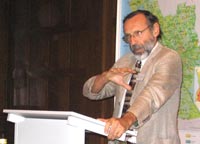Joseph
C. Miller :
Communication and
Commercialization in Central Africa:
Angola in the Context of World-Historical Processes of Modernity
 |
From
ancient times, Northern and portions of western and eastern Africa participated
in the historical processes of the Mediterranean and Indian Ocean worlds
around them, as a generation of historians has richly illustrated. Central
Africa significantly engaged comparable transport routes and communication
links only later, with the arrival of Portuguese mariners along its
Atlantic coasts at the end of the fifteenth century. From then, until
European politico-military consolidation of control over the region's
"Atlantic zone" at the end of the nineteenth century, African
residents of the region adapted cultural heritages oriented in other
directions and tailored to other purposes to new commercial and other
stimuli emanating from the distant ports of coastal "Angola".
The paper considers how people in the region attempted to seize local
advantage from consolidation of remote contact - via communications
and transport - beyond the horizons of daily life and personal experience,
domesticated and mystified strangers in terms of the older, local, cultural
resources on which all of those increasingly involved (Europeans not
excepted) drew to interpret strange and unsettling, accelerating change
and contact with unknown "others".
|
|

